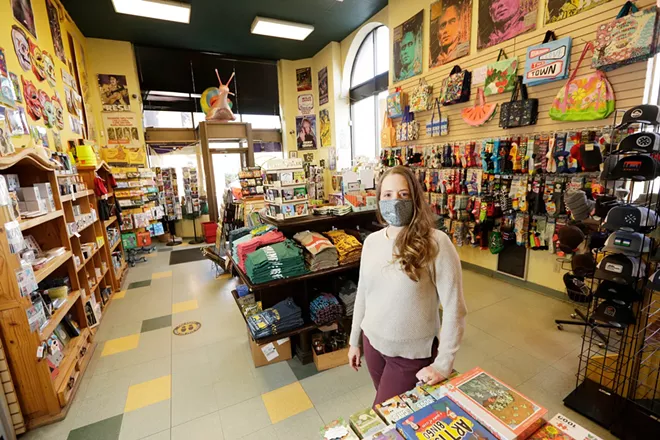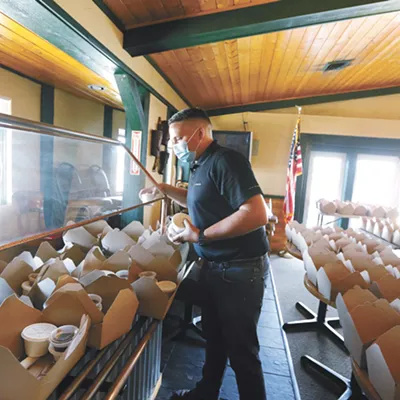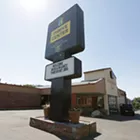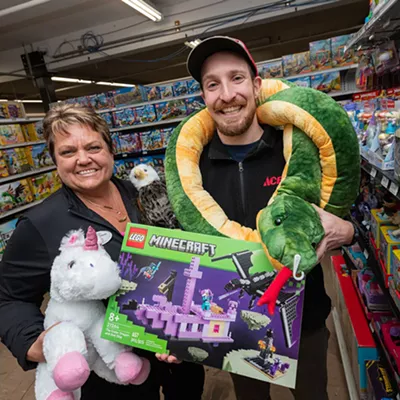
News that the popular downtown retailer Boo Radley's would be changing hands first went out in late 2019. Kris and Andy Dinnison, who had run the local curio and gift shop since 1993, announced to their staff at the annual Christmas party that ownership would be transitioning to longtime employee and store manager Jen Menzer.
Had 2020 been a year like any other, the sale would likely have been set in motion and concluded over the next few months. By March, however, COVID-19 had completely upended plans at Boo's, just as it had everywhere else.
"There was so much uncertainty," Kris Dinnison says. "We discussed it with Jen, and we said, 'We don't know how this is going to affect everything. We don't want to sell you a business that ends up going under.' So we all agreed to put it on hold until there was some better understanding of how this would all play out."
"I'm really glad we waited," says Menzer. "Last year, 2021, was our best year ever. There were a couple of months that just blew past months out of the water. Even when things were shut down, people were calling: 'How can I help you?' Spokane really kicks ass that way."
As the Inland Northwest enters a post-pandemic phase, which also happens to coincide with the region's yearly spring awakening, Menzer says she's seeing signs that 2022 is off to an equally strong start. She mentions the uptick in organized activities in nearby Riverfront Park as well as the recent return of events like Best of Broadway's Wicked at the First Interstate Center for the Arts and the NCAA Women's Basketball tournament at the Spokane Arena.
"It's weird to say, but you forget how those events affected you," Menzer adds. "Now, every weekend, it's like, 'Wow! What's going on this weekend?' The Pacific Northwest Qualifier volleyball tournament? That's freaking huge. There are people from Florida and Texas coming, and what are they going to do when they're not playing volleyball? They're going to shop, and they're going to eat."
While Menzer's experience certainly hasn't been shared by every local retailer, it does seem to be in line with broader economic trends for both the region and Washington state as a whole.
According to data from Eastern Washington University's Institute for Public Policy and Economic Analysis (IPPEA), taxable retail sales in Spokane County during the second quarter of 2021 exceeded the $2.9 billion of Q2 of 2019 by more than $600 million. Nor was that a strange pandemic anomaly. Total taxable retail sales held more or less constant between Q2 and Q3 2021, the period for which the most recent data is available.
"I don't know if people realize it, but retail spending has not been impacted that much," says Patrick Jones, the IPPEA's executive director.
He notes that, even in 2020, total retail spending in Spokane County was up slightly compared with the previous year's total of $11.5 billion. And based on early Q4 2021 estimates, Jones is predicting that the county's retail sales will continue to show robust quarterly and annual year-on-year growth.
"Since the pandemic, we've had a historic, unprecedented transfer of money from federal coffers in Washington, D.C., to companies and, more relevant in this case, individuals and households. That has boosted spending far beyond what we would have thought would have happened in the face of the pandemic," he says. Beyond stimulus infusions, Jones also attributes spending to "pent-up demand" as well as higher-than-average regional wage growth of 6 percent in 2020.
"While there have been closures during the pandemic, what we've been seeing is an encouraging amount of new businesses opening up."
Kevin Campbell, the Downtown Spokane Partnership's (DSP) business relations coordinator, is also of the opinion that adopting a big-picture perspective counters some of the bleaker assumptions of the pandemic's impact on the retail sector.
"If we zoom out a little bit, while there have been closures during the pandemic, what we've been seeing is an encouraging amount of new businesses opening up since March 2020 — not just new businesses, but locally owned small businesses," he says.
Within the borders of the DSP's business improvement district, or BID, Campbell says 17 retail spots have closed since the start of the pandemic, with the "good majority" of those taking place before 2021. By contrast, 20 retail businesses have opened during that same timeframe, and no retail closures have been reported so far in 2022.
Some of the highest activity has been concentrated in boutique and vintage clothing shops. On the west side of downtown Spokane alone, Pink Fern Collective, Do It with Soul, the Check Point, and Roses & Thread Boutique have all opened their doors in the past two years, and Echo Boutique launched its Echo Annex for men. Other new downtown clothing and accessory retailers include Dressed by Eva, Art Jacobs' Designer Scarf Collection, Teleport Vintage + Co., Birds in the Coast and Velvet Hammer. Meanwhile, since the pandemic began, only two downtown clothiers have shut their doors, one being from the national chain Jos. A. Bank.
Campbell also points to new retailers that are putting a different spin on traditional goods. A Modern Plantsman, for example, is combining a neighborhood florist vibe with contemporary home décor. Spokane Refillery has taken an eco-friendly, bring-your-own-container approach to personal care and household cleaning supplies.
"These are unique products or services. They're carving out a cool space for themselves," he says. "And maybe it's from all the pandemic pivots that we saw, but retailers are doing what they need to and being creative with their spaces. Birds in the Coast makes handbags and accessories, but they're using that brick-and-mortar space to host art events and fashion shows. Jumping Jackalope Axe Throwing was having yoga sessions and swing dance lessons to diversify what they can offer to people."
"Out of crisis comes great innovation and great entrepreneurship," says Alisha Benson, CEO of Greater Spokane Inc. (GSI). "We're seeing businesses rebound. We're seeing more activity across our downtown core center as well as across our disparate retail and commerce centers across the region. That's all very positive."
Benson maintains that the influx of grant funding and the direct allocation of CARES money within Spokane County helped stave off some of the worst effects of the pandemic. As a result, the rate of local small business closure was, she says, "less than many of our peers across the state."
However, she's quick to acknowledge that some businesses have been affected more deeply than others. The pandemic took a disproportionate toll on Black, Indigenous, people of color and female business owners because of reduced access to support networks and reprioritization of family responsibilities. That has prompted GSI to work more closely with organizations like AHANA, a multiethnic and multicultural business advocacy group, as well as the Spokane Independent Metro Business Alliance (SIMBA) and the Hispanic Business/Professional Association to better distribute relief and resources to those communities.
"The data is showing us that the pandemic was unbalanced in terms of its effect on sectors and industries," Benson says. "That's being mirrored in recovery as well, and we're paying close attention to that. We quickly saw how fragile those systems were and how a lot of our minority-owned businesses were not connected to the services that the rest of the business community was."

There may also be geographic unevenness in how consumers divvied up their dollars. While downtown Spokane seems to have seen healthy levels of retail spending during the pandemic, other localized areas appear to have been harder hit.
Jim MacKenzie, owner of Coolectibles in the Garland District, recently celebrated his variety shop's 10-year anniversary, but the pandemic's white-knuckle ride still shows no sign of ending for him and many of his peers.
"It was hardcore scary that I wasn't making any sales," he says. "This is my only source of income. And so I used a lot of Facebook Marketplace and Craigslist to get people to meet somewhere. For a while, vintage board games were really popular, and people wanted sports cards, Pokémon cards and '70s Star Wars cards."
But when foot traffic slowed out of consumer caution or public health restrictions, so did demand for Coolectibles' retro toys and hard-to-find memorabilia. MacKenzie recalls giving a regular customer free rein over the entire store so he could browse the shelves at his leisure and stock up on action figures. At one point, MacKenzie even started supplementing his shop's income by delivering food for Postmates.
"Normally, March is a busy month," he says. "Honestly, I can tell you that this March was as bad as January and February, which has surprised the business owners on my block. I've just gotten to the point where some of my regulars are popping up for the first time in two years. I need a miracle in these next few months. Things need to pick up like crazy."
MacKenzie expresses hope that the fast-approaching summer months will be gangbusters, but he isn't alone in feeling some apprehension. Patrick Jones, for instance, remains upbeat about the health of the region's retail economy, especially in light of its performance during the pandemic, but he's a little more cautious when it comes to predicting trends for the coming year.
"The question is, what are things going to look like in 2022? The forecasts that I'm reading from the state are definitely pretty meager increases for income," he says. "And the state economists that do this sort of thing on a day-in, day-out basis are not forecasting a huge increase in taxable retail sales in 2022. So I think we're definitely going to be looking at a different year in terms of overall consumer spending."
Factors like inflation, ongoing supply-chain constraints and stagnant wages could have an impact on whether local shoppers opt for small-scale items over big-ticket purchases like cars and furniture. That actually might end up helping retailers like Coolectibles and Boo Radley's.
"I know that some stores are still struggling," says Menzer, "but from talking to other folks downtown, it sounds like everyone's having a great year. I think people have come back to the world wanting to treat themselves. And birthdays and Christmas still happen. I say this with my fingers crossed, for sure, but I sure do hope we've come out the other side of this." ♦
























